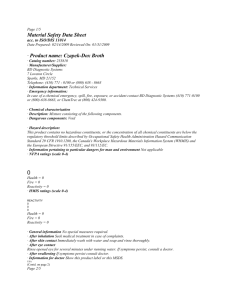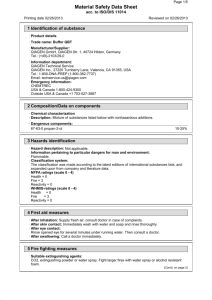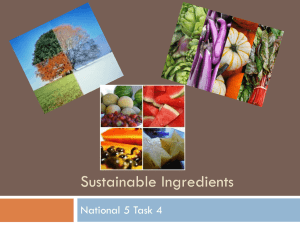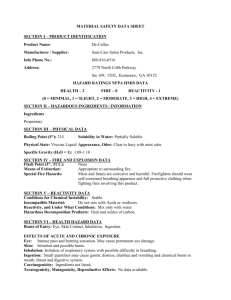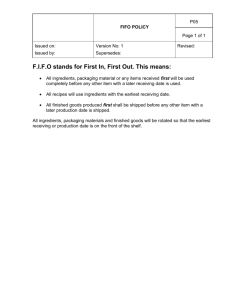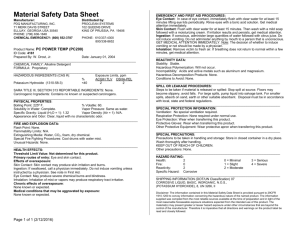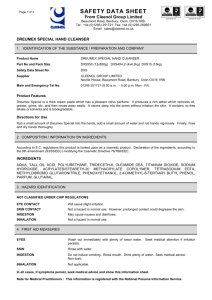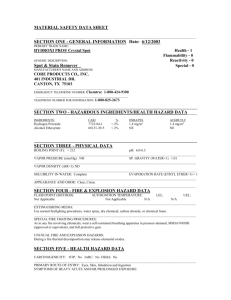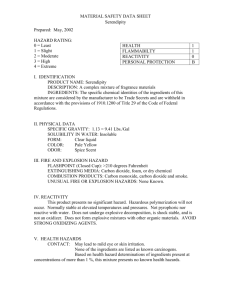promega
advertisement
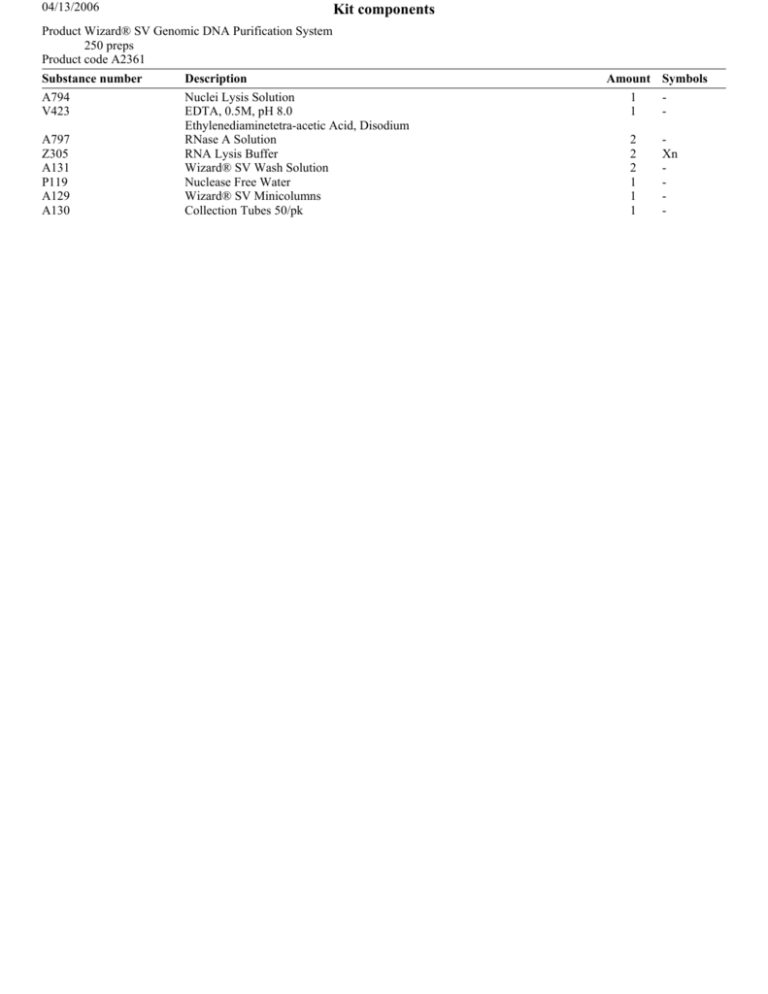
04/13/2006 Kit components Product Wizard® SV Genomic DNA Purification System 250 preps Product code A2361 Substance number A794 V423 A797 Z305 A131 P119 A129 A130 Description Nuclei Lysis Solution EDTA, 0.5M, pH 8.0 Ethylenediaminetetra-acetic Acid, Disodium RNase A Solution RNA Lysis Buffer Wizard® SV Wash Solution Nuclease Free Water Wizard® SV Minicolumns Collection Tubes 50/pk Amount Symbols 1 1 2 2 2 1 1 1 Xn - DR Page 1/6 Material Safety Data Sheet acc. to ISO/DIS 11014 Printing date 04/13/2006 Reviewed on 04/12/2006 1 Identification of substance Trade name: RNA Lysis Buffer Article number: Z305 Application of the substance / the preparation Laboratory chemicals Manufacturer/Supplier: Promega Corporation 2800 Woods Hollow Road Madison, WI 53711 U.S.A. 1-800-356-9526 or (608)-274-4330 Emergency information: CHEMTREC 1-800-424-9300 for call originating outside the United States dial 001-703-527-3887 2 Composition/Data on components Chemical characterization Description: Mixture of the substances listed below with nonhazardous additions. Dangerous components: 593-84-0 guanidinium thiocyanate Additional information: For the wording of the listed risk phrases refer to section 15. 25-50% 3 Hazards identification Hazard description: Xn Harmful Information pertaining to particular dangers for man and environment: Harmful by inhalation, in contact with skin and if swallowed. Irritating to eyes and skin. Classification system: The classification was made according to the latest editions of international substances lists, and is expanded upon by company and technical literature data. NFPA ratings (scale 0 - 4) Health = 2 Fire = 0 Reactivity = 0 HMIS-ratings (scale 0 - 4) Health = 2 Fire =0 Reactivity = 0 (Contd. on page 2) USA DR Page 2/6 Material Safety Data Sheet acc. to ISO/DIS 11014 Printing date 04/13/2006 Reviewed on 04/12/2006 Trade name: RNA Lysis Buffer (Contd. of page 1) OSHA Hazard Overview (Criteria according to 29CFR1910.1200): Toxic Irritant Primary route(s) of entry: Dermal Inhalation Oral Target Organ(s): May affect Nervous system (Neurotoxin) May cause Kidney damage (Nephrotoxin) Risk of damage to eyes Affects Gastrointestinal System Additional information: Product has been observed to have sensitizing effects. Product contains a toxic substance in greater than 1% and may exibit toxicological properties similar to the pure substance. 4 First aid measures General information: Symptoms of poisoning may even occur after several hours; therefore medical observation for at least 48 hours after the accident. After inhalation: Supply fresh air. If required, provide artificial respiration. Keep patient warm. Consult doctor if symptoms persist. In case of unconsciousness place patient stably in side position for transportation. After skin contact: Immediately wash with water and soap and rinse thoroughly. After eye contact: Rinse opened eye for several minutes under running water. If symptoms persist, consult a doctor. After swallowing: Immediately call a doctor. 5 Fire fighting measures Suitable extinguishing agents: CO2, extinguishing powder or water spray. Fight larger fires with water spray or alcohol resistant foam. Protective equipment: Mouth respiratory protective device. 6 Accidental release measures Person-related safety precautions: Not required. Measures for environmental protection: Dilute with plenty of water. Do not allow to enter sewers/ surface or ground water. Measures for cleaning/collecting: Absorb with liquid-binding material (sand, diatomite, acid binders, universal binders, sawdust). Dispose contaminated material as waste according to item 13. Ensure adequate ventilation. USA (Contd. on page 3) DR Page 3/6 Material Safety Data Sheet acc. to ISO/DIS 11014 Printing date 04/13/2006 Reviewed on 04/12/2006 Trade name: RNA Lysis Buffer (Contd. of page 2) 7 Handling and storage Handling: Information for safe handling: Keep receptacles tightly sealed. Ensure good ventilation/exhaustion at the workplace. No special precautions are necessary if used correctly. Information about protection against explosions and fires: No special measures required. Storage: Requirements to be met by storerooms and receptacles: No special requirements. Information about storage in one common storage facility: Not required. Further information about storage conditions: Keep receptacle tightly sealed. * 8 Exposure controls and personal protection Components with limit values that require monitoring at the workplace: The product does not contain any relevant quantities of materials with critical values that have to be monitored at the workplace. Additional information: The lists that were valid during the creation were used as basis. Personal protective equipment: General protective and hygienic measures: Keep away from foodstuffs, beverages and feed. Immediately remove all soiled and contaminated clothing. Wash hands before breaks and at the end of work. Avoid contact with the eyes and skin. Breathing equipment: In case of brief exposure or low pollution use respiratory filter device. In case of intensive or longer exposure use respiratory protective device that is independent of circulating air. Protection of hands: Protective gloves Selection of the glove material on consideration of the penetration times, rates of diffusion and the degradation Material of gloves The selection of the suitable gloves does not only depend on the material, but also on further marks of quality and varies from manufacturer to manufacturer. As the product is a preparation of several substances, the resistance of the glove material can not be calculated in advance and has therefore to be checked prior to the application. Eye protection: Tightly sealed goggles * 9 Physical and chemical properties General Information Form: Color: Odor: Fluid Colorless Characteristic Change in condition Melting point/Melting range: Undetermined. Boiling point/Boiling range: 100°C (212°F) Flash point: Not applicable. Auto igniting: Product is not selfigniting. Danger of explosion: Product does not present an explosion hazard. (Contd. on page 4) USA DR Page 4/6 Material Safety Data Sheet acc. to ISO/DIS 11014 Printing date 04/13/2006 Reviewed on 04/12/2006 Trade name: RNA Lysis Buffer (Contd. of page 3) Density at 20°C (68°F): 1.10200 g/cm³ Solubility in / Miscibility with Fully miscible. Water: pH-value at 20°C (68°F): 7.5 Solvent content: Organic solvents: Water: 0.0 % 52.0 % Solids content: 48.0 % 10 Stability and reactivity Thermal decomposition / conditions to be avoided: No decomposition if used according to specifications. Dangerous reactions Reacts with strong acids. Reacts with oxidizing agents. Dangerous products of decomposition: Nitrogen oxides (NOx) Carbon monoxide and carbon dioxide Sulfur oxides (SOx) 11 Toxicological information Acute toxicity: LD/LC50 values that are relevant for classification: 593-84-0 guanidinium thiocyanate Oral LD50 475 mg/kg (Rat) By analogy to guanidine hydrochloride Dermal LD50 >2000 mg/kg (Rabbit) By analogy to Guanidine hydrochloride. Primary irritant effect: on the skin: Irritant to skin and mucous membranes. on the eye: Irritating effect. Sensitization: Sensitization possible through inhalation. Additional toxicological information: Harmful Irritant The product shows the following dangers according to internally approved calculation methods for preparations: 12 Ecological information General notes: Water hazard class 1 (Self-assessment): slightly hazardous for water Do not allow undiluted product or large quantities of it to reach ground water, water course or sewage system. USA (Contd. on page 5) DR Page 5/6 Material Safety Data Sheet acc. to ISO/DIS 11014 Printing date 04/13/2006 Reviewed on 04/12/2006 Trade name: RNA Lysis Buffer (Contd. of page 4) 13 Disposal considerations Product: Recommendation: Must not be disposed of together with household garbage. Do not allow product to reach sewage system. Uncleaned packagings: Recommendation: Disposal must be made according to official regulations. Recommended cleansing agent: Water, if necessary with cleansing agents. 14 Transport information Contact Promega Safety Department for additional transportation information DOT regulations: Hazard class: Land transport ADR/RID (cross-border): ADR/RID class: Maritime transport IMDG: IMDG Class: Marine pollutant: No Air transport ICAO-TI and IATA-DGR: ICAO/IATA Class: - * 15 Regulations Sara Section 355 (extremely hazardous substances): None of the ingredients are listed. Section 313 (Specific toxic chemical listings): None of the ingredients are listed. TSCA (Toxic Substances Control Act): All ingredients are listed. Proposition 65 Chemicals known to cause cancer: None of the ingredients are listed. Chemicals known to cause reproductive toxicity for females: None of the ingredients are listed. Chemicals known to cause reproductive toxicity for males: None of the ingredients are listed. Chemicals known to cause developmental toxicity: None of the ingredients are listed. Cancerogenity categories EPA (Environmental Protection Agency) None of the ingredients are listed. (Contd. on page 6) USA DR Page 6/6 Material Safety Data Sheet acc. to ISO/DIS 11014 Printing date 04/13/2006 Reviewed on 04/12/2006 Trade name: RNA Lysis Buffer (Contd. of page 5) IARC (International Agency for Research on Cancer) None of the ingredients are listed. NTP (National Toxicology Program) None of the ingredients are listed. TLV (Threshold Limit Value established by ACGIH) None of the ingredients are listed. MAK (German Maximum Workplace Concentration) None of the ingredients are listed. NIOSH-Ca (National Institute for Occupational Safety and Health) None of the ingredients are listed. OSHA-Ca (Occupational Safety & Health Administration) None of the ingredients are listed. Product related hazard informations: The product has been classified and marked in accordance with directives on hazardous materials. Hazard symbols: Xn Harmful Hazard-determining components of labelling: guanidinium thiocyanate Risk phrases: Harmful by inhalation, in contact with skin and if swallowed. Irritating to eyes and skin. Safety phrases: Keep container in a well-ventilated place. In case of contact with eyes, rinse immediately with plenty of water and seek medical advice. This material and its container must be disposed of in a safe way. Wear suitable protective clothing and gloves. If swallowed, seek medical advice immediately and show this container or label. National regulations: Water hazard class: Water hazard class 1 (Self-assessment): slightly hazardous for water. 16 Other information This information is based on our present knowledge. However, this shall not constitute a guarantee for any specific product features and shall not establish a legally valid contractual relationship. Department issuing MSDS: Promega Corporation Environmental Health and Safety Department 2800 Woods Hollow Road Madison, WI Ph:(608)274-4330 * Data compared to the previous version altered. USA
